Cancelling your registration will remove your access to the event. If you proceed, you will no longer be able to participate or access event-related materials.
Deleting your account will remove your access to the event.

Anne-Raphaëlle Audouin has been working in the natural resources sector for 15 years. In her current role as chief executive officer for Nukik Corporation, she leads the approval and financial modeling for the Kivalliq Hydro-Fibre link. A first-of-its-kind, 230 kV 1,200 km-long electric transmission system extending from Manitoba into the Kivalliq region of Nunavut, the Kivalliq link will deliver reliable renewable energy and broadband Internet service to the region. She is responsible for securing ground-breaking partnerships and collaboration for this Inuit-led initiative, brokering support from multiple jurisdictions at the regional, provincial, and federal levels, and with a variety of stakeholders. This $1.6B project is set to unlock tremendous economic and social opportunities for the region, while promoting reconciliation with the Inuit and contributing very significantly to Canada’s climate objectives.
Anne-Raphaëlle was with WaterPower Canada between 2014 and 2022, where she, as president and CEO, was the national spokesperson representing the largest electricity sector in Canada, one that generates billions of dollars for the Canadian economy every year and employs more than 130,000 people across the country. Before WaterPower Canada, Anne-Raphaëlle worked for several years as an environmental and social impacts management specialist for Hatch Ltd., an international engineering consulting firm.
A tireless champion for sustainable development, her career has been focused on advancing technologies and industries that help better Canada’s environmental profile while reinforcing the country’s leading role in major project developments. She works with stakeholders at the political and policy levels, is regularly quoted in national media, and sits on several boards of directors.
In 2019, Anne-Raphaëlle was appointed by the Canadian federal government to serve on the Joint Public Advisory Committee of the Commission for Environmental Cooperation, a trilateral organization composed of Canada, Mexico, and the United States, with the mission to promote continental cooperation in ecosystem protection and sustainable economic development and ensure active public participation and transparency in its actions. She is also a co-founder of the Canadian Council on Renewable Electricity (CanCORE).
Anne-Raphaëlle speaks French, English and Spanish and is certified in Project Planning and Controls. She has a degree in political science from the Université of Nantes (France), and degrees in civil and common law from the University of Ottawa. She also earned a master’s degree in environmental and natural resources management from Dalhousie University. More recently, she obtained a certificate from Yale School of Management in corporate sustainability.
She lives in Ottawa with her husband, two young children, and orange cat, Nemo.
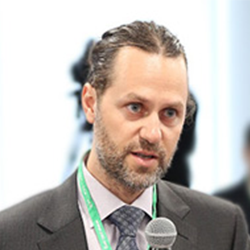
Louie Porta is the Executive Director of Oceans North. With extensive experience living in, working in and exploring Arctic Canada, he oversees projects related to marine conservation, oil and gas, Arctic shipping, indigenous protected areas, coastal stewardship, and plastics. He formerly served as lead political adviser to Mary Simon during her appointment as Minister’s Special Representative for Arctic Leadership. He was appointed to serve on Canada’s National Advisory Panel—charged with recommending how Canada can meet its international conservation obligations. Louie is also an adviser to the Students on Ice Foundation, is a senior associate for the International Institute for Sustainable Development, serves on the governing council of the Ocean Tracking Network and sits on the research oversight committee for Genome Canada’s investigation into oil spill countermeasures for the Arctic. He has a master’s degree from Dalhousie University’s School for Resource and Environmental Studies, and lives in Halifax, Nova Scotia, with his wife and three children.
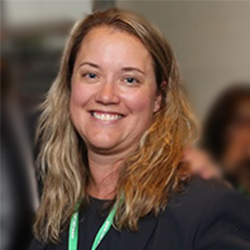
Professor Elizabeth Whitsitt has been engaged in a variety of issues in the area of international law, particularly international economic law. Her research interests include the unifying role of adjudication in global economic governance, and the relationship between international economic law and the regulation of natural resources, energy, environment and human rights.
Professor Whitsitt teaches various courses in international law and dispute resolution at the University of Calgary, Faculty of Law. Professor Whitsitt received her LLM in international legal studies from New York University and completed her PhD in 2017. Her PhD research focused on the intersection of trade law and investment arbitration. More specifically, her work considered the role that adjudicators play in the continuing conversation about the relationship between the international trade and international investment law regimes and the extent to which these regimes are uniting through the process of adjudication. Professor Whitsitt has published and presented extensively in the areas of international trade and investment law. She is also the recipient of a SSHRC Doctoral Fellowship, a Killam Memorial Scholarship and the Marc Lalonde Prize for Excellence in International and Commercial Arbitration.
Professor Whitsitt is a member of the Law Society of Alberta, the Canadian Council on International Law (CCIL), the American Society of International Law (ASIL), and the European Society of International Law (ESIL).
Professor Whitsitt is also an appointee to Canada’s roster for NAFTA Chapter 19 Binational Panels.
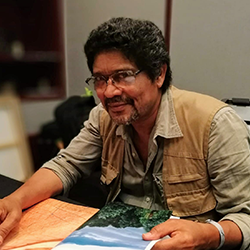
An agricultural engineer specializing in forests and a graduate of the Chapingo Autonoma University, Luis Alfonso Argüelles Suárez is currently Mexico’s representative on the Forest Stewardship Council (FSC), a position he has occupied since 2014. From 1995 to 1997, he sat on the FSC’s Board of Directors.
Between 1981 and 1986, he worked at the then National Forestry Research Institute, now known as the National Forestry, Agriculture and Livestock Research Institute (Inifap). After serving as a researcher commissioned by a pilot Quintana Roo forestry project as the Mexican counterpart of a Mexico-Germany cooperation agreement, he served as forestry advisor on a forestry management project in Quintana Roo under the aegis of a Mexico-UK cooperation agreement. For ten years, he was Technical Director of the Quintana Roo Association of Ejido Forestry Producers. He has also been an advisor to the National Union of Community Forestry Organizations (Unofoc), a consultant with the German Agency for Technical Cooperation (GTZ) on a forestry policy project in Ecuador and a consultant with the World Wildlife Fund (WWF) in Mexico, Nicaragua, Panama and Peru. Argüelles Suárez is a founding member of Trópica Rural Latinoamericana, an organization which has executed projects for the MacArthur Foundation, the WWF and Corredor Mesoamericano-México.
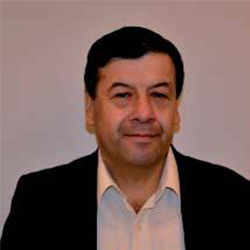
An agricultural engineer with an MA and PhD in tropical agroecosystems from the College of Postgraduates, Esteban Escamilla Prado’s doctoral dissertation concerned the study of organic coffee quality in Mexico. Since 1987, he has been a research professor at the Eastern University Regional Center (CRUO) of the Autonomous University of Chapingo (UACh), in Huatusco, Veracruz. Formerly the director of CRUO, he is currently research director at the National Center for Coffee Research, Innovation and Technological Development (Cenacafé). Aside from his research and teaching responsibilities, he dedicates part of his time to training and outreach work, teaching courses and offering certificate programs on comprehensive sustainable coffee cultivation, organic agriculture, biodiversity, sustainable land use, and agroforestry. Having ample experience in coffee cultivation, his research includes a range of topics: plant genetic resources, genetic improvement, coffee growing systems and technologies, economic diversification, edible insects, and worm farming. He has directed and advised numerous undergraduate and postgraduate dissertations. He has also published numerous books, articles and manuals, as well as presented many papers in local, national and international events.
Throughout his professional career, Escamilla Prado has participated in diverse activities related to comprehensive sustainable coffee cultivation in Mexico and various coffee-producing countries in Central and South America, with a focus on training and advising small scale and Indigenous producer cooperatives on organic production, fair trade and quality control. As an organic coffee producer himself, he is a founding member of the “Catuai Amarillo” cooperative and the Federation of High Mountains Specialty Coffees (Incafesam), social enterprises that export organic coffee to the United States and Europe. Moreover, he is a member and current president of the Steering Committee of the Mexican Certification Authority for Ecological Products and Processes (Certimex). He is a former mayor of Chocamán, Veracruz, his place of residence. Since 2019, he has collaborated with the Sowing Life program of the Mexican government’s Ministry of Welfare as an agroforestry and sustainable coffee cultivation expert.
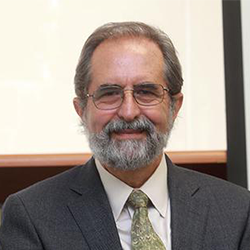
Economist at the National Autonomous University of Mexico (UNAM), with a PhD in planning and development from the University of Liverpool’s Faculty of Social and Environmental Studies, Pedro Moctezuma Barragán is a prominent national and international activist on the issues of water, the environment and community participation. He is currently coordinator of the Sustainability Research Program at the Autonomous Metropolitan University (UAM) where he also sits on the Board of Directors. He is a member of the National Coordination Council of Agua para Tod@s, Agua para la Vida (“Water for all, Water for Life”) and a participant in the Society, Environment and Institutions (SUSMAI) graduate seminar at UNAM.
Founder and Director of the lncalli lxcahuicopa Center for Sustainability (Centli), which also includes agro-ecological and forestry centers, both located in Tlalmanalco, Mexico State, and co-founder of the Amecameca and La Compañía River Basins Commission, Moctezuma Barragán also has experience in implementing community development processes and in projects on the design and self-managed construction of social housing. He has overseen planning in areas such as ecological land-use planning, water resources and micro watersheds management, municipal development and comprehensive solid waste management.
His experience in teaching spans four decades. Founder of the Department of Socioeconomic Research at the Torreón School of Economics, in Coahuila, he has given over 140 courses in various academic institutions and advised a large number of professional and postgraduate dissertations. In addition, he has been a member of various academic commissions, organized courses and workshops, participated in the reviewing of undergraduate and MA curricula, and presented over two hundred papers and conferences in dozens of universities in Mexico, as well as in Europe, Canada, the United States and Latin America. The author of over 60 publications, he has also sat on multiple editorial boards.
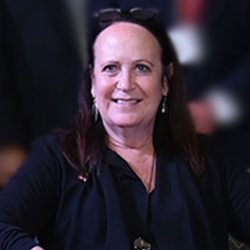
Felicia Marcus is the William C. Landreth Visiting Fellow at Stanford University’s Water in the West Program, an attorney, consultant, and member of the Water Policy Group. She most recently served as Chair of the California State Water Resources Control Board, implementing laws regarding drinking water, water quality, and state’s water rights, hearing regional board water quality appeals, settling disputes, and providing financial assistance to communities to upgrade water infrastructure.
Before her appointment to the Water Board, Marcus served in positions in government, the nonprofit and private sector. In government, she served as the Regional Administrator of the Environmental Protection Agency’s Pacific Southwest Region during the Clinton Administration, where she was known for her work bringing unlikely allies together for environmental progress and for making the agency more responsive to the communities it serves, particularly Indian Tribes, communities of color, local government, and agricultural and business interests. Preceding her work at the EPA, Marcus served as the President of the Board of Public Works for the City of Los Angeles, presiding over the department through a time of great change and challenge, including numerous emergency response situations (including flood, earthquake and riots).
In the non-profit world, she was the Western Director for the Natural Resources Defense Council, and prior to that the Executive Vice-president and Chief Operating Officer of the Trust for Public Land. Marcus also has an extensive background as a private sector and public interest lawyer, as well as a community organizer, most notably as a founder and general counsel to Heal the Bay. She has served as the director of litigation for Public Counsel, a public interest law firm; an associate at the law firm of Munger, Tolles & Olson; a visiting fellow at the Center for Law in the Public Interest; a law clerk to the Honorable Harry Pregerson (9th Circuit Court of Appeals); and legislative assistant to Congressman Anthony C. Beilenson in Washington, DC.
In 2020 she was elected a Fellow of the National Academy of Public Administration. She holds a Bachelor of Arts in East Asian Studies from Harvard College, and Juris Doctor degree from New York University School of Law and studied at Hong Kong University on a Rotary Fellowship.
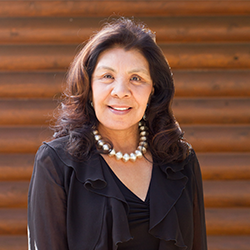
Octaviana V. Trujillo (Yaqui), Ph.D., is the 2023 chair of the CEC’s Joint Public Advisory Committee (JPAC), having been first appointed as a member of JPAC by US President Barack Obama in 2015. She is founding Chair and Professor Emerita in the Department of Applied Indigenous Studies at Northern Arizona University and the former chairwoman of the Pascua Yaqui Tribe of Arizona. She has spent her career advocating for the rights of Indigenous Peoples and developing educational courses, initiatives, and programs to support Tribal Nation Building and Indigenous communities, especially with regard to sustaining Indigenous languages, cultures and lifeways, and working with Indigenous youth.
She is a current Soros Equality Fellow and the 2021 American Educational Research Association, Indigenous Peoples of the Americas Research awardee for outstanding scholarship. She is also an advisory board member to Alianza Indígena Sin Fronteras, whose mission is to affirm the rights of Indigenous Peoples, including their right to self-determination, their collective human and civil rights, the rights of sovereignty and the protection of sacred sites, and their right to free and unrestricted movement across international borders. Trujillo also served as an active national member of the American Friends Service Committee and Farmworker Justice, working to foster community-based resources for promoting social justice.
Her extensive international experience as researcher, mediator, and advisor on the topics of human and Indigenous rights includes participation in the UN Permanent Forum on Indigenous Issues and serving on the EPA Governmental Advisory Committee, which helps to shape US policies that are intended to improve environmental and health conditions in Canada, Mexico, and the United States, and the Global Diversity Foundation, which promotes agricultural, biological, and cultural diversity around the world through research, training and social action.
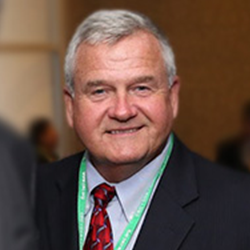
Considered one of the nation’s most experienced and respected environmental leaders, Robert Varney is a former Environmental Protection Agency (EPA) New England Regional Administrator, who currently is President of Normandeau Associates, a science-based environmental firm with eighteen offices in 12 states. He was the longest-serving regional administrator and top environmental official in New England and is credited with instituting many innovative approaches and policy initiatives that have served as national models. Prior to EPA, Mr. Varney was one of the nation’s longest-serving state environmental commissioners, appointed by three Governors of both political parties.
Bob is nationally recognized for his efforts on global climate change; energy efficiency and renewables; homeland security and preparedness; clean air, clean water and safe drinking water; superfund and brownfields cleanup and redevelopment; environmental justice and healthy communities; restoration of rivers, lakes and coastal areas; strong and consistent enforcement and compliance assistance; strengthening partnerships; and improved agency management and performance.
Mr. Varney has chaired the Environmental Council of the States (ECOS), State/EPA Superfund Policy Forum, Federal Ozone Transport Commission (OTC), Governmental Advisory Committee to the US Representative to the Commission for Environmental Cooperation (CEC), Gulf of Maine Council on the Marine Environment, New England Interstate Water Pollution Control Commission and New England Governors Conference Environment Committee. He also was a member of EPA’s Environmental Justice Advisory Council and currently serves on the NH Board of Trustees for The Nature Conservancy (TNC) and the CEC Joint Public Advisory Committee (US, Mexico, Canada). Bob is the recipient of numerous environmental awards such as the EPA Lifetime Achievement Award, NE Water Works Association’s John H. Chafee Award, Environmental Business Council of NE’s Paul Keough Award and the ECOS Founder’s Award.
